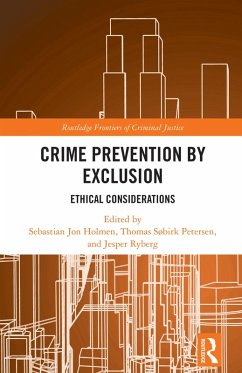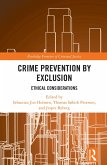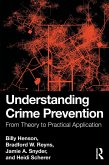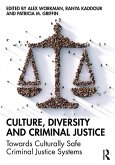Crime Prevention by Exclusion (eBook, PDF)
Ethical Considerations
Redaktion: Holmen, Sebastian Jon; Ryberg, Jesper; Petersen, Thomas Søbirk
41,95 €
41,95 €
inkl. MwSt.
Sofort per Download lieferbar

21 °P sammeln
41,95 €
Als Download kaufen

41,95 €
inkl. MwSt.
Sofort per Download lieferbar

21 °P sammeln
Jetzt verschenken
Alle Infos zum eBook verschenken
41,95 €
inkl. MwSt.
Sofort per Download lieferbar
Alle Infos zum eBook verschenken

21 °P sammeln
Crime Prevention by Exclusion (eBook, PDF)
Ethical Considerations
Redaktion: Holmen, Sebastian Jon; Ryberg, Jesper; Petersen, Thomas Søbirk
- Format: PDF
- Merkliste
- Auf die Merkliste
- Bewerten Bewerten
- Teilen
- Produkt teilen
- Produkterinnerung
- Produkterinnerung

Bitte loggen Sie sich zunächst in Ihr Kundenkonto ein oder registrieren Sie sich bei
bücher.de, um das eBook-Abo tolino select nutzen zu können.
Hier können Sie sich einloggen
Hier können Sie sich einloggen
Sie sind bereits eingeloggt. Klicken Sie auf 2. tolino select Abo, um fortzufahren.

Bitte loggen Sie sich zunächst in Ihr Kundenkonto ein oder registrieren Sie sich bei bücher.de, um das eBook-Abo tolino select nutzen zu können.
This book addresses the complex ethical challenges related to preventive exclusion that have only been addressed in a limited way in the academic literature.
- Geräte: PC
- mit Kopierschutz
- eBook Hilfe
Andere Kunden interessierten sich auch für
![Crime Prevention by Exclusion (eBook, ePUB) Crime Prevention by Exclusion (eBook, ePUB)]() Crime Prevention by Exclusion (eBook, ePUB)41,95 €
Crime Prevention by Exclusion (eBook, ePUB)41,95 €![Understanding Crime Prevention (eBook, PDF) Understanding Crime Prevention (eBook, PDF)]() Billy HensonUnderstanding Crime Prevention (eBook, PDF)36,95 €
Billy HensonUnderstanding Crime Prevention (eBook, PDF)36,95 €![The Borders of Violence (eBook, PDF) The Borders of Violence (eBook, PDF)]() Marie SegraveThe Borders of Violence (eBook, PDF)38,95 €
Marie SegraveThe Borders of Violence (eBook, PDF)38,95 €![Crime Prevention (eBook, PDF) Crime Prevention (eBook, PDF)]() Steven P. LabCrime Prevention (eBook, PDF)69,95 €
Steven P. LabCrime Prevention (eBook, PDF)69,95 €![Juvenile Justice in Europe (eBook, PDF) Juvenile Justice in Europe (eBook, PDF)]() Juvenile Justice in Europe (eBook, PDF)39,95 €
Juvenile Justice in Europe (eBook, PDF)39,95 €![Culture, Diversity, and Criminal Justice (eBook, PDF) Culture, Diversity, and Criminal Justice (eBook, PDF)]() Culture, Diversity, and Criminal Justice (eBook, PDF)38,95 €
Culture, Diversity, and Criminal Justice (eBook, PDF)38,95 €![Biosecurity, Economic Collapse, the State to Come (eBook, PDF) Biosecurity, Economic Collapse, the State to Come (eBook, PDF)]() Christos BoukalasBiosecurity, Economic Collapse, the State to Come (eBook, PDF)41,95 €
Christos BoukalasBiosecurity, Economic Collapse, the State to Come (eBook, PDF)41,95 €-
-
-
This book addresses the complex ethical challenges related to preventive exclusion that have only been addressed in a limited way in the academic literature.
Dieser Download kann aus rechtlichen Gründen nur mit Rechnungsadresse in A, B, BG, CY, CZ, D, DK, EW, E, FIN, F, GR, HR, H, IRL, I, LT, L, LR, M, NL, PL, P, R, S, SLO, SK ausgeliefert werden.
Produktdetails
- Produktdetails
- Verlag: Taylor & Francis eBooks
- Seitenzahl: 258
- Erscheinungstermin: 15. Oktober 2024
- Englisch
- ISBN-13: 9781040150054
- Artikelnr.: 72274539
- Verlag: Taylor & Francis eBooks
- Seitenzahl: 258
- Erscheinungstermin: 15. Oktober 2024
- Englisch
- ISBN-13: 9781040150054
- Artikelnr.: 72274539
- Herstellerkennzeichnung Die Herstellerinformationen sind derzeit nicht verfügbar.
Sebastian Jon Holmen is Postdoctoral Fellow at Roskilde University. He works on the research project SITE (Situational Crime Prevention and Ethics) supported by the Independent Research Fund Denmark. Holmen has published in philosophical journals, including Criminal Law and Philosophy , Criminal Justice Ethics, Res Publica, Philosophia, Ethical Theory and Moral Practice, the Journal of Medical Ethics, Neuroethics, and the Journal of Cognition and Neuroethics. Thomas Søbirk Petersen is Professor of Bioethics and Criminal Justice Ethics at Roskilde University. He is the PI of the research project SITE (Situational Crime Prevention and Ethics) supported by the Independent Research Fund Denmark. Petersen has published in philosophical journals, including AI and Ethics, Bioethics, Criminal Law and Philosophy, Drugs: Education, Prevention and Policy, Ethical Theory and Moral Practice, Neuroethics, the Journal of Business Ethics, the Journal of Ethics, the Journal of Global Ethics, the Journal of Medical Ethics, the Journal of the Philosophy of Sport, the International Journal of Law and Psychiatry, Res Publica, and Theoria. Jesper Ryberg is Professor of Ethics and Philosophy of Law, at Roskilde University and Head of the Research Group for Criminal Justice Ethics. He has published in philosophical journals, including Criminal Law and Philosophy, Philosophical Papers, Theoria, The Philosophical Quarterly, Res Publica, Ethical Theory and Moral Practice, the Journal of Applied Philosophy, Social Theory and Practice, the Journal of Medical Ethics, the Journal of Ethics, Neuroethics, Analysis, and Utilitas.
Introduction: Crime Prevention by Exclusion: Setting the Scene
Sebastian Jon Holmen, Thomas Søbirk Petersen and Jesper Ryberg
1 Assessing exclusionary modes of crime reduction
Zachary Hoskins
2 Crime distribution and state obligations
Jesper Ryberg
3 The wrongness of preventive exclusion
David Birks
4 'A disproportionate and degrading approach that acts without
discrimination'? The expressive dimension of exclusionary crime prevention
techniques
Christopher Bennett
5 Homelessness, poverty, and the limits of preventive exclusion
Terry Skolnik
6 Situational crime prevention or getting to the root causes of crime?
Thomas Søbirk Petersen
7 Gated communities, social exclusion, and the right to basic security
Richard L. Lippke
8 Gated communities and discrimination against the poor
Kasper Lippert-Rasmussen
9 Out of sight, out of mind: Is the state justified in using selective
exclusion as punishment?
Katrina L. Sifferd
10 The ethics and politics of nudges and niches: A critical analysis of
exclusionary environmental designs
Lucy Osler, Bart Engelen, and Alfred Archer
11 Homelessness and the use of music in crime prevention
Hadessa Noorda
12 'Hanging out and sleeping on the ground': Acoustic environments,
rationality, and the minimal account of Permissible means of prime
prevention
Sebastian Jon Holmen
Sebastian Jon Holmen, Thomas Søbirk Petersen and Jesper Ryberg
1 Assessing exclusionary modes of crime reduction
Zachary Hoskins
2 Crime distribution and state obligations
Jesper Ryberg
3 The wrongness of preventive exclusion
David Birks
4 'A disproportionate and degrading approach that acts without
discrimination'? The expressive dimension of exclusionary crime prevention
techniques
Christopher Bennett
5 Homelessness, poverty, and the limits of preventive exclusion
Terry Skolnik
6 Situational crime prevention or getting to the root causes of crime?
Thomas Søbirk Petersen
7 Gated communities, social exclusion, and the right to basic security
Richard L. Lippke
8 Gated communities and discrimination against the poor
Kasper Lippert-Rasmussen
9 Out of sight, out of mind: Is the state justified in using selective
exclusion as punishment?
Katrina L. Sifferd
10 The ethics and politics of nudges and niches: A critical analysis of
exclusionary environmental designs
Lucy Osler, Bart Engelen, and Alfred Archer
11 Homelessness and the use of music in crime prevention
Hadessa Noorda
12 'Hanging out and sleeping on the ground': Acoustic environments,
rationality, and the minimal account of Permissible means of prime
prevention
Sebastian Jon Holmen
Introduction: Crime Prevention by Exclusion: Setting the Scene
Sebastian Jon Holmen, Thomas Søbirk Petersen and Jesper Ryberg
1 Assessing exclusionary modes of crime reduction
Zachary Hoskins
2 Crime distribution and state obligations
Jesper Ryberg
3 The wrongness of preventive exclusion
David Birks
4 'A disproportionate and degrading approach that acts without
discrimination'? The expressive dimension of exclusionary crime prevention
techniques
Christopher Bennett
5 Homelessness, poverty, and the limits of preventive exclusion
Terry Skolnik
6 Situational crime prevention or getting to the root causes of crime?
Thomas Søbirk Petersen
7 Gated communities, social exclusion, and the right to basic security
Richard L. Lippke
8 Gated communities and discrimination against the poor
Kasper Lippert-Rasmussen
9 Out of sight, out of mind: Is the state justified in using selective
exclusion as punishment?
Katrina L. Sifferd
10 The ethics and politics of nudges and niches: A critical analysis of
exclusionary environmental designs
Lucy Osler, Bart Engelen, and Alfred Archer
11 Homelessness and the use of music in crime prevention
Hadessa Noorda
12 'Hanging out and sleeping on the ground': Acoustic environments,
rationality, and the minimal account of Permissible means of prime
prevention
Sebastian Jon Holmen
Sebastian Jon Holmen, Thomas Søbirk Petersen and Jesper Ryberg
1 Assessing exclusionary modes of crime reduction
Zachary Hoskins
2 Crime distribution and state obligations
Jesper Ryberg
3 The wrongness of preventive exclusion
David Birks
4 'A disproportionate and degrading approach that acts without
discrimination'? The expressive dimension of exclusionary crime prevention
techniques
Christopher Bennett
5 Homelessness, poverty, and the limits of preventive exclusion
Terry Skolnik
6 Situational crime prevention or getting to the root causes of crime?
Thomas Søbirk Petersen
7 Gated communities, social exclusion, and the right to basic security
Richard L. Lippke
8 Gated communities and discrimination against the poor
Kasper Lippert-Rasmussen
9 Out of sight, out of mind: Is the state justified in using selective
exclusion as punishment?
Katrina L. Sifferd
10 The ethics and politics of nudges and niches: A critical analysis of
exclusionary environmental designs
Lucy Osler, Bart Engelen, and Alfred Archer
11 Homelessness and the use of music in crime prevention
Hadessa Noorda
12 'Hanging out and sleeping on the ground': Acoustic environments,
rationality, and the minimal account of Permissible means of prime
prevention
Sebastian Jon Holmen







